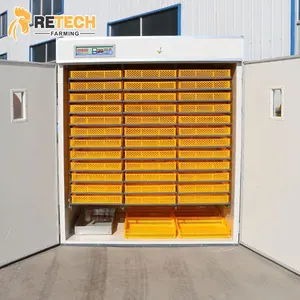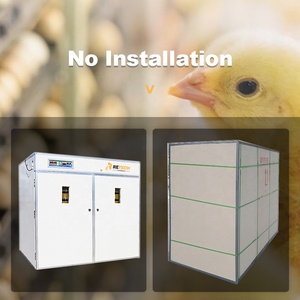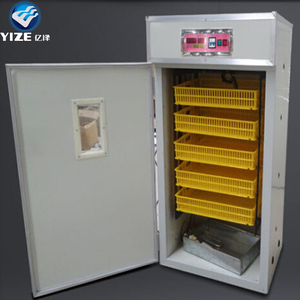
All categories
Featured selections
Trade Assurance
Buyer Central
Help Center
Get the app
Become a supplier

(2125 products available)


























A used incubator for chickens, especially the GQF models, has various types to meet the diverse requirements of its buyers. These types focus primarily on factors like egg capacity, incubation method, and heating system.
The GQF forced air incubators are some of the best options, such as the GQF 1502. They come with small fans installed inside to circulate and distribute the air. This air distribution results in even temperature and humidity levels throughout the incubator. Many poultry farmers prefer this type of incubator due to its efficiency, especially when scaling up operations. The forced air model is ideal for incubating larger eggs, like duck or goose eggs, which require more stable environmental conditions for successful hatching.
The GQF still air incubators are small, simple, and easy to operate. These models rely on natural heat rising to create warm spots within the incubator. This method may be less sophisticated than forced air models, but some small-scale poultry farmers still like it. Still air incubators are easy to set up and maintain, ideal for beginning poultry farmers or those incubating small batches of chicken eggs. The still air models work well for chicken eggs because they require less precise temperature control.
Among the GQF models, the automatic egg turner incubators automatically turns the eggs during the incubation process. This turning is important as eggs need to be turned regularly to ensure the developing embryos are nourished evenly. These incubators come with built-in egg trays and a motorized turning system. This feature appeals to busy poultry farmers who may not have time for manual turning.
Hatcher incubators are intended mainly for the final stage of the incubation process. The difference between a hatcher and an incubator is that hatchers create the right conditions needed for the eggs to hatch: optimal temperature, humidity, and ventilation for the newly hatched chicks. Many poultry farmers utilize separate hatching incubators to enable the main incubators to consistently monitor the eggs during the incubation time without the disturbance caused by hatching activities.
The success that accompanies the incubation of eggs greatly depends on the features found in the GQF incubators. This is because the features improve the performance and usability of the incubator. Some of these features include automatic egg turners, humidity control systems, or transparent windows.
Many GQF models, such as the GQF 1502, come with a fan-forced air system that ensures proper air circulation within the incubator. This forced air system maintains uniform temperature and humidity levels throughout the unit to help guarantee consistent and efficient hatching results. Air circulation is crucial for embryo development as it helps distribute heat and oxygen to all parts of the eggs.
Several GQF incubators are fitted with a digital thermostat and hygrometer that help monitor and control temperature and humidity with great precision. These tools help simplify the process as they provide real-time readings on the LCD screen. This means that the user is expected to make fewer adjustments and can more easily keep proper conditions for different egg types throughout the year. Maintaining the right temperature and humidity level is essential for successful hatching as it helps the eggs to develop properly.
An automatic egg turner can be found in many GQF incubator models. This turner turns the eggs automatically rather than having the farmer do it manually. This feature is important since regular egg turning is needed for the proper embryo development of many poultry species. Turning the eggs ensures the yolk stays centered and prevents it from sticking to the eggs' inner shell membranes. This system also saves time for farmers, allowing them to focus on other aspects of their operations.
Most GQF incubator models have a set of small viewing windows on their doors. These windows make it easier for users to see the eggs without opening the incubator and disrupting the internal conditions. It is possible to check on the incubation progress of their eggs using these windows. This feature helps the farmers avoid unnecessary opening of the incubator door and helps maintain stable conditions for the eggs during the hatching process.
A used GQF incubator is useful for many situations in a farming business, from hatching chicks for a commercial poultry operation to producing a varied flock on a small farm. These durable machines give users the tools to successfully hatch eggs and nourish healthy chicks.
Many GQF incubators that are on sale are perfect for big poultry farms with a lot of eggs to hatch. Advanced models with large capacities can handle many eggs at once, making them good for big poultry businesses. Forced air incubation systems in the incubators make sure temperature and humidity levels stay the same during the whole hatching process. This leads to more healthy chicks hatching and helps poultry farms reach their production goals.
Egg production is what many large farms want to achieve. They use GQF incubators to hatch layer chicks so they can produce eggs for commercial use. Layer chicks are raised until they grow into mature hens that lay egg regularly. Having a reliable incubator is very important for farmers, who then need to replace their flocks or keep the supply of chicks steady all year long.
Many farmers work with rare breeds or want to maintain heritage varieties to provide a large and diverse poultry genetic material. Hatcher and forced air incubators from GQF are very useful to these farmers. Iconic breeds such as Orpingtons or Leghorns can be hatched to keep important bloodlines intact. This variety can help increase demand for niche markets. These markets include small farms or local egg producers who focus on providing unique breeds for customers.
Lots of businesses, like hatcheries or feed stores, incubate eggs so that they can sell healthy day-old chicks to their customers. They need dependable incubators like the GQF models to make sure that they can provide high-quality chicks. The GQF machines can hatch many egg types at once, from chicken to quail, which gives customers a wide range of choices. Customers are more likely to buy from places offering strong, disease-free chicks because the success of the business depends on healthy chicks being delivered.
The choice of a used GQF incubator for sale really depends on the unique needs of the users, which may vary depending on their space and budget. Priorities like the capacity required or the type of incubation preferred help to narrow down the options and choose the right incubator.
The right incubator size is necessary for a small hobby farm or a big commercial poultry operation. If space is not an issue, then farmers who hatch large quantities of eggs should choose GQF models with a larger capacity, such as the GQF 1502. They can hold hundreds of eggs at a time. Those who hatch a few eggs for personal use or a small market would find that GQF's smaller still air models are sufficient.
Some incubation techniques work better than others for certain types of eggs or farming situations. Farmers who demand consistent results should use GQF forced air incubators. The fan-assisted air circulation ensures even heat distribution to help the eggs develop properly. Still air incubators are simple and cheap, making them useful for small-scale operations with chicken eggs or beginner farmers.
For those who are cost-conscious, considering a used GQF incubator can be a great way to get a reliable hatching system without spending too much. Often, gently-used models work just as well as new ones. However, it is necessary to ensure the incubator runs smoothly to achieve the desired level of production. To help with this, users should think about the cost of energy bills as well as repairs and maintenance to determine the total cost of keeping the incubator running.
A1: Consistently monitoring the temperature, humidity, and egg turning while minimizing disruptions ensures healthy chick hatching.
A2: Incubators create optimal conditions for developing eggs, while hatchers provide a separate environment for the hatching process.
A3: The forced air system helps by distributing heat evenly, improving temperature consistency and enhancing hatching rates.
A4: Turning eggs maintains even heat distribution, prevents yolk adhesion, and supports proper embryo development for healthier chicks.